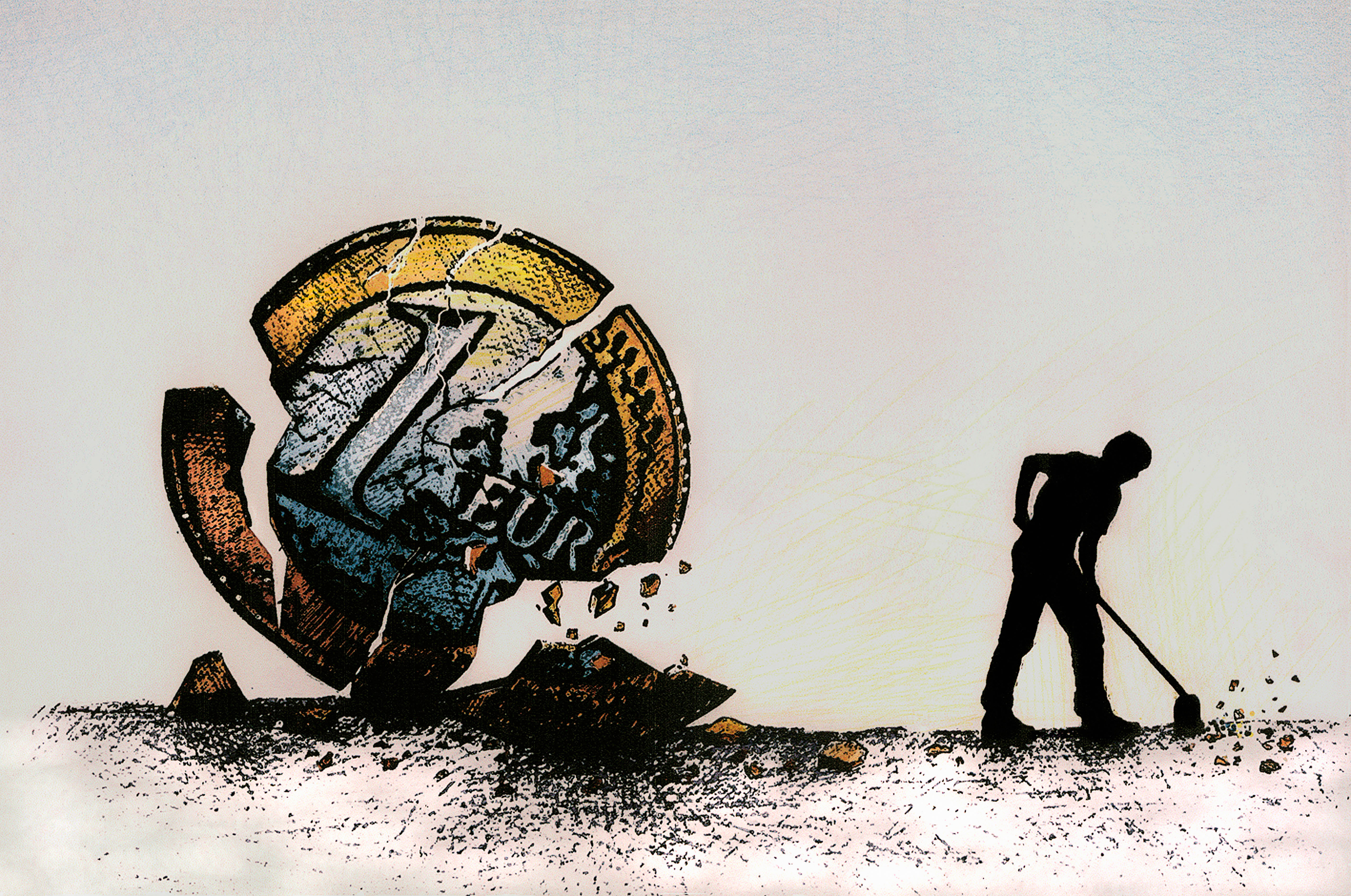The European Central Bank is about to do something very stupid
Is the ECB completely insane?


Back in 2012, European Central Bank President Mario Draghi declared that "the ECB is ready to do whatever it takes to preserve the euro." He has apparently already forgotten that promise.
The ECB didn't even begin to make good on that vow until March 2015, when it kicked off a quantitative easing (QE) program worth $60 billion a month. In plain English, that means the ECB started creating a bunch of euros out of thin air and using them to buy up various financial assets. In March 2016, it kicked things up a notch, to $80 billion in purchases a month.
The results have been middling, with Greece, Italy, and Spain stuck in varying degrees of depression. Greece has an astonishing 23 percent unemployment rate and a debt load that's grown in four years from 159 percent of its economy to 183 percent. Italy's unemployment rate is stuck at 12 percent, and its debt increased from 123 percent of its economy to 133 percent. Spain's unemployment rate is still a little over 18 percent.
The Week
Escape your echo chamber. Get the facts behind the news, plus analysis from multiple perspectives.

Sign up for The Week's Free Newsletters
From our morning news briefing to a weekly Good News Newsletter, get the best of The Week delivered directly to your inbox.
From our morning news briefing to a weekly Good News Newsletter, get the best of The Week delivered directly to your inbox.
This is all a big problem. "Just as an individual will struggle to pay off a punishing credit card bill if her salary stays flat or falls, a country cannot reduce its debt pile without expanding its economy," The New York Times recently observed. Until those economies are repaired, the eurozone remains in danger of tearing itself apart.
Yet Draghi and Co. seem to be looking at this situation and thinking "mission accomplished."
Since at least October, there's been talk that the ECB might wind down QE. A decision is now expected in March. The Times reports that international financial markets are already getting jittery, and yields on Greek and Italian bonds in particular are rising as demand for them falls.
That's the exact opposite of what the ECB should be doing. As the situations in Greece, Italy, and Spain show, the program so far has been insufficient and poorly targeted.
A free daily email with the biggest news stories of the day – and the best features from TheWeek.com
The core issue here is not just that to reduce its debt burden, a country must grow its economy faster than its debt load. It's that in order to get its economy going again, a country must actually first increase its debt. Deficit spending injects money into the economy — through lower taxes, more generous pensions, bigger welfare state aid, public investment, and direct government employment — so that people can start buying and selling, investing, and hiring again. By contrast, tax hikes and spending cuts to shrink deficits suck money out of the economy, grinding it down and preventing a recovery.
But when it comes to Greece in particular, Germany and the rest of the eurozone aren't keen on bailing it out unconditionally. So they demand that Greece borrow from them only on the condition of massive austerity, so it can run a budget surplus and pay its creditors back.
Hence, Greece's endless doom loop: Eurozone-provided bailouts pump money into Greece only to have eurozone-demanded austerity suck it right back out again.
But bailouts from other national governments aren't the only way to get money into an economy. The ECB's quantitative easing program concentrates on buying bonds — i.e. national debt. So it could increase that bond-buying and focus on countries like Greece, Italy, and Spain. Stimulating their economies this way would avoid all the tricky politics and quid pro quos of other countries, like Germany and France, forking over portions of their own budgets.
Unfortunately, the ECB has done the exact opposite. The bulk of QE so far has gone to German bonds, with total purchases of over $300 billion. France came in second at around $250 billion. Italy is in third with just over $200 billion, and Spain is in fourth with around $150 billion.
None of that makes sense: Italy and Spain need help way more than France, and Germany doesn't need help at all.
Even worse, Greek bonds have been left out of QE entirely. According to Draghi, the ECB will include Greek bonds once the country has reformed its budget situation so its debt load becomes more sustainable. That's utterly circular reasoning, since Greece's debt load won't become sustainable until after inclusion in the QE bond-buying has reinvigorated its economy. But the eurozone's monetary authorities have also put pressure on Italy and Spain to reduce their budget deficits as a condition for the ECB to keep injecting money into their economies. Which is why their economies, while better off than Greece's, have stalled out.
This is all completely insane. The ECB is not a for-profit enterprise, and it can literally print all the euros it wants. It doesn't need to be paid back. Ultimately, the only upper limit on QE is the risk of inflation. And so far, inflation in the eurozone hasn't been able to break above 2 percent since 2013. So the ECB should be hitting the gas, not the brakes.
If it wanted to, the ECB could just decide tomorrow to inject more money into Greece, Spain, and Italy. (It has even included Greece in years past.) The whole point of a central banking system is that it can give away money for nothing. That's what it's there for: to be the lender of last resort.
But Draghi and the rest of the eurozone elites either don't grasp that bailouts provided by the monetary system don't work the same way as bailouts from other eurozone member's budgets or they feel politically obligated to pretend they work the same.
The misery of Greece and the others seems destined to continue, until one way or another the eurozone tears itself apart. So much for "whatever it takes."
Jeff Spross was the economics and business correspondent at TheWeek.com. He was previously a reporter at ThinkProgress.
-
 Woolf Works: the Royal Ballet’s ‘inspired’ production’
Woolf Works: the Royal Ballet’s ‘inspired’ production’The Week Recommends Wayne McGregor’s three-act show brings Virginia Woolf’s creative world ‘vividly’ to life
-
 The 8 best biopic movies of the 21st century (so far!)
The 8 best biopic movies of the 21st century (so far!)the week recommends Not all true stories are feel good tales, but the best biopics offer insight into broader social and political trends
-
 Washington grapples with ICE’s growing footprint — and future
Washington grapples with ICE’s growing footprint — and futureTALKING POINTS The deadly provocations of federal officers in Minnesota have put ICE back in the national spotlight
-
 Why Greenland’s natural resources are nearly impossible to mine
Why Greenland’s natural resources are nearly impossible to mineThe Explainer The country’s natural landscape makes the task extremely difficult
-
 Iran cuts internet as protests escalate
Iran cuts internet as protests escalateSpeed Reada Government buildings across the country have been set on fire
-
 US nabs ‘shadow’ tanker claimed by Russia
US nabs ‘shadow’ tanker claimed by RussiaSpeed Read The ship was one of two vessels seized by the US military
-
 How Bulgaria’s government fell amid mass protests
How Bulgaria’s government fell amid mass protestsThe Explainer The country’s prime minister resigned as part of the fallout
-
 Femicide: Italy’s newest crime
Femicide: Italy’s newest crimeThe Explainer Landmark law to criminalise murder of a woman as an ‘act of hatred’ or ‘subjugation’ but critics say Italy is still deeply patriarchal
-
 Brazil’s Bolsonaro behind bars after appeals run out
Brazil’s Bolsonaro behind bars after appeals run outSpeed Read He will serve 27 years in prison
-
 Americans traveling abroad face renewed criticism in the Trump era
Americans traveling abroad face renewed criticism in the Trump eraThe Explainer Some of Trump’s behavior has Americans being questioned
-
 Nigeria confused by Trump invasion threat
Nigeria confused by Trump invasion threatSpeed Read Trump has claimed the country is persecuting Christians
